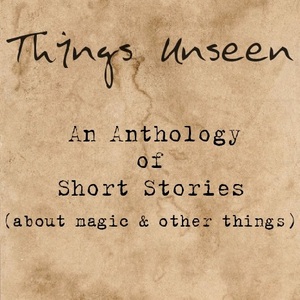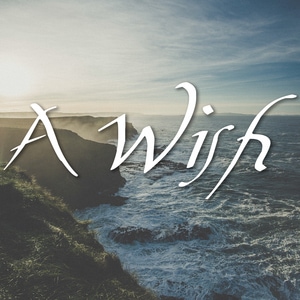Our parents died when we were still quite young. My father was a fisherman, and one day the sea claimed him. My mother began to fade away after his death, as if she had lost her will to exist without him, until one day she was gone too and my brother and I were left alone in the world. As the eldest, it was my responsibility to look after my brother, but we struggled to feed ourselves from day to day. So my brother became a fisherman, like our father before him, and we were able to keep ourselves from starving. We were not prosperous. We were rarely even comfortable. But we got by. For years, we got by.
One day, my brother was fishing in his little boat on a part of the coast he had never been to before. He came by a small cove, hidden along the cliff side. It was difficult to get to, the waters were treacherous and full of crumbling rocks that threatened to dash his boat to pieces upon them. But what he found there was worth the danger, for though there were few fish, no other fishermen had discovered this hidden place, and the cove and tide pools on the shore were rich in the bounty of the sea. Almost every day he was able to bring back clams and mussels, eels, barnacles, sea cucumbers, crabs as big as your head, shrimp and scallops and star fish and once, even an octopus. It was thriving with life, and for the first time since our parents died, we did not go hungry, not even for one night.
Then, one day, he caught something different.
He was hauling up his net, and found it was heavier than it had ever been before. It was all he could do to keep the rope from being wrenched from his grasp and lost in the water. Inch by inch, he dragged it up, expecting to find the largest sea creature he had ever seen. But when he was finally able to haul it up over the side of the boat, all he saw was one solitary fish, no larger than a sea bass.
It was clear as soon as he laid eyes upon it that it was anything but ordinary, however. The fish glittered and gleamed in the sunlight, with scales of pure gold and eyes of silver. The weight of the thing threatened to capsize his boat as it flopped about, desperately caught up in the net. He stared at it in wonder, and realized he could sell a fish like that for enough money that he and I could live in comfort for the rest of our lives. But then, to his even greater surprise, it spoke to him.
“Please, dear fisherman,” it begged. “Please release me! I am an extraordinary fish, and if you do, I will grant you any wish you desire. The sun, the moon, the stars, they could all be yours, if you would but set me free.”
“Any wish?” my brother asked. “Wealth? Power? Happiness? You could grant me all that?”
“All that and more, good fisherman,” said the golden fish. “The only domain I have no power over is death, but the rest of the world is yours if you only give me back to the ocean. Take pity, I beg of you.”
My brother considered the fish’s offer. He was never hasty. Neither of us ever acted in impulse. So measured, so careful. Look where it got us.
“I will release you,” he said finally, “but on one condition. I won’t make my wish now. I have to consult my sister first, for she is all I have left in the world, and my fortune is her fortune as well. I will release you now and return home to ask her what we should wish for, if you swear that you will be waiting here for my return tomorrow.”
“I swear it,” said the fish, and my brother did as he promised and cut his net. It disappeared into the dark water, and my brother, hoping he had not made a mistake in trusting the golden fish, sailed back home.
As soon as he found me, he told me what had happened, about the fish and the wish it had promised him.
“Just one wish?” I asked.
“A wish for anything. The sun, the moon, the stars. Even happiness. Whatever we want, we can have–except for life. I know what you are thinking, I thought it too. But it cannot bring back the dead.”
“So we have a wish, but we cannot use it on the one thing we want? What else could we possibly wish for we would not come to regret? A wish is a dangerous thing to waste. Money can keep us fed and comfortable, but won’t give us happiness. Happiness won’t keep us fed. We could make ourselves a king and queen, and die in a bloody revolution when the land is stricken with famine. We could wish for a purse full of gold that never empties, but then be stricken by a disease for which there is no cure that money can buy. Just one wish, and a million ways to waste it.”
“Then what do you propose we do?” he asked me, and I thought long and hard about what the wisest course of action would be.
“I think,” I finally said to him, “that you should go back and catch the fish again. Bring it here, and we will put it in a bowl, and let people pay us to come and see a golden, talking fish. It sounds like a wondrous creature, I have no doubt that it will draw people from all over the world to see it. Right now our worst suffering is our impoverishment, but we need not use the wish to cure ourselves of that. We can keep the fish until we have become so rich that money is no longer any concern, and then we will decide what wish to make. When we have all the food and comfort that money can buy, when our minds are not clouded by constant hunger and the struggles of poverty, then we will make our wish. We can use for something wealth cannot give us, or better yet, save it for when we are in need of it most.”
My brother agreed with me that this was the wisest decision we could make. Having a wish a year ago could have saved our parents, and it seemed prudent to keep one on hand in case a similar need arose. So the next morning, before the sun had risen, he took to his sailing boat and made his way to the secluded little cove.
Waiting for him just as promised was the golden fish, the first rays of the morning sun glancing off its head that broke the surface of the water.
It swam up to my brother and asked, “What is your wish, good fisherman?”
And my brother threw his net over the animal. It fought, and was as heavy as it had been the first time my brother had struggled with it, but once again he managed to haul it up into the boat and dump it into a bucket of seawater.
“I apologize, my friend,” he said to it, “but we need the wealth and fame a creature like you can provide us with more than we need a wish right now.”
“I can give you wealth and fame if you wish for it!” the fish pleaded, but my brother only shook his head sadly and steered the boat for home.
“Your wish is too valuable to waste on instant pleasures or material wealth. We must save it for when we are in need of it most.”
The fish pleaded with him the entire way back, but my brother did not give in, though it pierced his heart to hear it beg so miserably.
It took the both of us to drag the bucket back to our house, and together we poured the fish and the seawater into a large glass bowl which we had placed in our back garden. We tried to make it comfortable, filling the bottom of the bowl with small pebbles and bits of seaweed. But even though it was the largest bowl we owned, the fish had barely enough room to swim in a circle. And it continued to entreat us to release it all the while, begging us to send it home to the ocean where it belonged, but we covered out ears and didn’t listen.
Don’t look at me like that. You don’t know what it was like. We weren’t heartless to the poor creature’s plight, please understand. We weren’t planning on keeping it like that forever, just long enough to make a comfortable living off its handsome scales and clever speech. And once we had decided the cleverest wish to ask of it. After that, we would have let it go again. We tried to explain that to the fish, but it only continued to plead and cry, big silver tears. Eventually we covered the bowl with a cloth, and we went back inside.
From then on, we spread the word to as many people that we could about our wondrous fish. First to come were our neighbors; then people from distant towns; then people from the other side of the country–people from miles and miles away who had heard about the golden, talking fish, and wanted to see it with their own eyes.
We weren’t greedy and charged them only a small sum, but so many people came in those first few weeks that we had no doubt we would be able to live like kings in no time at all.
But the fish wouldn’t cooperate.
We would lead people into our back garden and take the cloth off the bowl. The guests would gasp in delight, remarking how beautifully the fish’s golden scales gleamed, how bright its silver eyes shone, and how it spoke just like a man. But when they fell quiet to listen to its speech, and they heard it pleading.
“Please please let me go, I beg of you! I am so unhappy in this little bowl, I long for the wide, open ocean. Staring out of the curved glass sides of this bowl is making me go blind. I can only swim in little circles, and my body is aching and twisted. And I’m so lonely. I miss the other fish, I miss the quiet of the deep water, I miss the darkness when I dive down deep. Here it is all too bright and loud, and the water in this little bowl grows so hot when the sun shines on it. I am going to die if you keep me like this, please have some kindness! What have I done to deserve this? Why are you doing this to me? Take some pity and let me go!”
On and on it went, and the people we brought to see it would grow uncomfortable and start muttering amongst themselves, casting us ugly looks as if we were torturing the creature--as if they hadn’t paid good money to come and gawk at it themselves. You are looking at me the same way now, but you don’t understand what it was like. We weren’t trying to be cruel, we were just trying to secure our future. If the fish had only listened to us, if it had just cooperated, things might have been different. Like your lover, no? But people are so selfish. They only think about what they want.
Then, slowly at first, the crowds of people who came to see the creature began to dwindle. At the height of our fame we had a hundred visitors a day, and made money almost faster than we could spend it. We repaired the holes in the roof of our cottage, we mended the fences around our land, we patched holes and cracks in the wall and for the first time since our parents died the cold night air didn’t seep into our home and make us shiver in our beds. We bought clothing that hadn’t been frayed and darned a hundred times over. We ate until we thought our stomachs would burst every night, and were certain our troubles were over. But all those people who came, who helped make us rich, they never came again after they listened to the fish’s words.
We went from bringing in a hundred people a day, to fifty, then twenty, ten. At the end, those few who did come only wanted to see if what they had heard about the fish’s terrible condition was true, and they sneered and scolded us for how we were treating it. And then none at all would come. Word had spread about the unhappiness of the fish. Our neighbors turned their noses up at us. People in town wouldn’t talk to us. We were shunned, even though we tried again and again to explain that we weren’t going to keep the fish forever.
“Just let the poor thing go!” they would say to us in the streets.
“We will, we will,” we tried to assure them, “Once we’ve made a little more money, just a little more!”
“Greedy, greedy,” they said.
Sometimes one or two people would still show up, people who hadn’t heard about the fish’s sadness, or people who didn’t care. We clung to the hope that we could convince the others to come again, and we kept trying, even as what money we had made in those first few weeks dwindled. We hadn’t saved anything. We had spent everything we’d earned on making our lives more comfortable, always thinking that there would be more money later.
Two weeks after our last visitor, we spent our last penny. A week after that, we had eaten our last loaf of bread.
We were warm at night. Our clothes were clean and new. And yet again, we teetered on the brink of starvation.
We begged our neighbors for help, for a few spare coins, for a little meat or drink, like they had been kind enough to give us in the past when times were at their toughest.
“After the way you’ve exploited that poor creature?” they said. “You’ve only brought this upon yourselves.”
Intentions. Intentions don’t matter to other people, do they? They only care about what they can see. Once you’ve jumped off this cliff, will your lover know what you meant by it? Or will she just see a silly, lovesick fool? How do you punish someone who doesn’t understand what they’ve done wrong?
Where was I? Oh, yes. Selfishness. Of course.
My brother came to me once it was clear that our plans had gone irrevocably wrong.
“Perhaps we should make our wish now and set it free,” he tentatively suggested.
“No,” I disagreed. “We may need that wish yet. Let’s not waste it until we have lost all hope.”
“All hope is lost,” he said. “Can’t you see that? We’re back where we started, only now we’re miserable too. At least I’m miserable. We’re hated and ostracized, and I don’t even care about the wish any more. What we are doing to the fish hurts my soul. I never wanted to capture it in the first place. Can’t we just make our wish and leave it in peace?
“We’re not doing anything to the fish,” I replied angrily. “We’re keeping it alive and fed, we’re doing nothing to harm it.”
“We’re making it miserable,” he said.
“We are miserable. We need to save our wish now more than ever. Do you remember what happened to our parents? We could have saved them if we’d had a wish then. You still have your boat. You can still fish, so we can still keep ourselves fed. All hope is not lost, not yet.”
So my brother returned to fishing to keep us fed. He refused to even go into the back garden any more, not wishing to see the golden fish in its bowl. I only went out there to feed it, running back into the house with my hands over my ears while it cried after me.











Comments (1)
See all